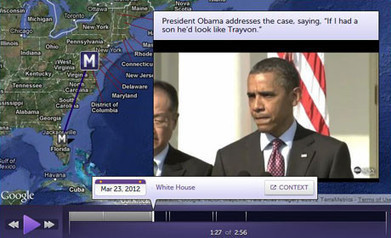To hell with mass media. Journalism, properly conceived, is a service, not a content factory. As such, news must be built on relationships with individuals a...

|
Scooped by Robin Good |
At the recent International Journalism Festival in Perugia, Italy, Jeff Jarvis, Professor of Journalism at CUNY, gave a keynote speech that provides valuable insight and advice as to where the future of news and journalism are headed.
While the full keynote and the Q&A with the audience is recorded in full in this 55' mins long video, I have summarised here below his key points and takeaways, so that you can get at least a good basic idea of his viewpoints in under 3 mins.
The value of this keynote for content curators is the fact that Jeff Jarvis highlights and validates a process, mission and approach where the ability to collect, vet and curate information, resources and tools, to satisfy a specific need, is going to take a much more central and important role in the development of new forms journalism and in the evolution of the business models that will support it.
Jeff Jarvis' Key 15 Takeaways on the Future of Journalism:
1. Mass audiences don't exist.
This is just a way to look at people that served the mass media industry model.
2. Journalism is in the service business.
We must fundamentally rethink the way we produce the news, so that they actually serve specific people needs.
3. Journalism needs to specialise.
Do what you do best and link to the rest.
4. Relationships and listening
Need to listen and create relationships with their community
Need to understand what the problems and needs and intercept them
5. Journalists need to become community advocates
Need to change how we evaluate waht we do as journalists
Must help people to make sense
6. Community.
Move from media-centric to community-centric
Go to the community first, to observe, to ask and listen, before creating content that serve their needs
7. Membership.
This is not about subscriptions.
It is about collaboration and what we do with the community we serve.
People don't want to belong to a media organisation.
People want to be part of true passionate communities.
Community can contribute: Content, effort, marketing, resources, ideas, feedback, customer assistance, etc.
8. Beyond articles.
Continuous live blogging, tweeting, data, etc.
There a lot more formats that can be used to create valuable content.
9. Mobile is not about content delivery.
Mobile is about use cases
re-organise the news around the public specific needs we would create higher value that by following our own production cycle.
What about if we broke up news in hundreds of different use cases that specifically apply to mobile?
For example: give me all the world news that count in 2 mins.
Or: I want to know everything that happens about this story, in real-time
or: I want to connect with members of my community and accomplish something
10. We've to re-invent TV news
TV news sucks.
There is a lot of untapped tech that we can use.
Great opportunities to do better.
11. Business Models - Digital first
Every journalist is fully digital.
Print comes after digital.
Print no longer rules the culture of a newspaper.
12. The traditional (ad-based) mass media business model kills journalism.
By importing the old business model of mass media onto the Internet, with reach and frequency, mass, scale, volume, we have corrupted journalism.
Clicks will inevitably lead to cats.
If your goal is more clicks you will put up more cats.
We have to move past volume, to value.
We need give more relevance to our readers.
And we can do so only if we get to know them as individual members of a true communities.
13. Paywalls are not the way to go.
The idea of selling content online doesn't work very well. Unless you are Bloomberg or someone who sells information that is very fresh and valuable for a specific need.
14. Native advertising is not going to save us.
Rather, with it, we may giving up our true last values, as our own voices, authority and our ability to tell a story. If we fool our readers into thinking that native advertising comes from the same people who gives them the news, we have given up our last asset. Credibility.
15. Rethink the metrics.
Views, clicks, likes are no longer appropriate.
Attention is a better metric. (see Chartbeat).
The metric that is count to count most is going to be more qualitative than quantitative and it is going to be about whether we are valuable in people's lives. I don't know how to measure that, but we need to find out how to do it.
My comment: This is a must-watch video for any journalist seriously interested in getting a better feel for the direction and focus that news and journalism will take.
Insightful. 10/10
Original video: https://youtu.be/RsPvnVeo1G0
(55':30")
Keynote: 0:00 to 29:43
Audience Q&A: 30:00 to 55:30



 Your new post is loading...
Your new post is loading...





![Capturing Information From Online Sources: Scraping for Journalists by Paul Bradshaw [eBook] | Content Curation World | Scoop.it](https://img.scoop.it/xTQm0wQspBzPO_YQj3N5nzl72eJkfbmt4t8yenImKBVvK0kTmF0xjctABnaLJIm9)





for students in journalism near me